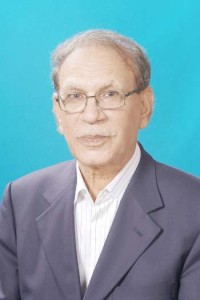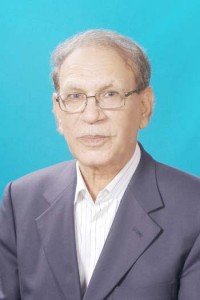Every year, the Kashmiris throughout the world observe 19th July as “Accession to Pakistan Day” to re-affirm their commitment to continue their struggle till attainment of their objective. The partition plan of 3rd June 1947 had envisaged that over 565 princely states would join India or Pakistan keeping in view the aspirations of their people and geographical contiguity. On 19th July 1947, All Jammu and Kashmir Muslim Conference had organized a convention in Srinagar at Sardar Muhammad Ibrahim Khan residence and passed a resolution for merging Kashmir with Pakistan, which stated: “This convention of Muslim Conference has reached the conclusion that geographical conditions, 80 per cent Muslim population, important rivers of Punjab passing through the state, language, cultural, ethnic and economic relations and contiguity of the state with Pakistan make it imperative to merge with Pakistan”. It was a historic moment since it gave the liberation movement a clear objective and goal.
In October 1947, India moved its military to occupy Jummu and Kashmir. Volunteers from Azad Kashmir and other parts of Pakistan went to Kashmir to fight shoulder to shoulder with their brethren. And it was India that took the matter to the UN under Chapter VI of the UN Charter dealing with Pacific Settlement of Disputes. However, Indian forces invaded Srinagar on 27th October 1947 and forcibly occupied Jammu and Kashmir in utter violation of the partition plan and also against the wishes of the Kashmiri people. Since then India continues with its policy of ethnic cleansing and hatching conspiracies to alter the demography of the State. In 1947, the Muslims constituted 77% while the Hindu population was 23% of the population. The ratio is now 64.19% to 32.24% due to massive killings and other controversial acts like settlement of non-Muslim migrants (Hindus and Sikhs) from Punjab.
Indian forces are resorting to controversial draconian laws like AFSPA, PSA to arbitrarily arrest any individual for an indefinite period. Investigations in several cases have revealed that thousands of Kashmiris have been killed in staged encounters. Most of the times, majority of popular pro-movement leadership is detained or house-arrested by security forces using cover of draconian laws and mostly without prior orders from the higher authorities. As per a Kashmiri human rights group, Voice of Victim (VOV), a total of 1471 torture centres are operating in Occupied Kashmir, where arrested Kashmiri leaders and youth are subjected to severe torture. Though Kashmiris’ struggle continues since 1948, they took up arms in 1989 to counter India’s state terrorism and, of course, to get rid of Indian yoke. Since then, around 100,000 Kashmiris have been martyred and many more injured and maimed.
However, killings and atrocities committed by Indian armed forces could not break their will or weaken their resolve, and they continue to give supreme sacrifice for their inalienable right of self-determination accepted by United Nations Security Council. Kashmiris have undergone untold sufferings for the last 66 years, but international community has been found wanting in discharging its obligations in implementation of UNSC resolutions. Indian army’s atrocities on the people of Kashmir, their murder, rape and fake encounters have turned Kashmir into a hell that would stretch Dante’s imagination. Indian soldiers continue to arrest innocent Kashmiris, keep them in extra-judicial custody and kill them in fake encounters so as to earn rewards or out-of-turn promotions. Nameless and mass graves bear a testimony to India’s reign of terror. Despite promises, India has failed to demilitarize the Indian Held Kashmir or reduce its troops to mitigate suffering of Kashmiris.
Frustrated by the apathy of the international community and non-implementation of United Nations Security Council resolutions, Kashmiri youth had taken up the arms in 1989. However after 9/11, political landscape of the world changed dramatically, and now those waging struggle for their rights are dubbed as terrorists. Nevertheless, writers, intellectuals and peace loving people condemned India’s repression on people of Kashmir and also for treating them as second class citizens. European Parliament had passed many resolutions including the one on 10th July 2008 calling upon the Government of India to hold an impartial inquiry into the unidentified mass graves discovered in the disputed state of Jammu & Kashmir. But resolutions and condemnations are not enough; the world must take notice of the atrocities committed against Kashmiri people, especially the women and children by Indian security forces and help Kashmiris to get their right of self-determination bestowed by the UNSC.
With the situation in Indian occupied Kashmir sharply deteriorating, Pakistan raised the issue in the United Nations General Assembly on last Wednesday making a call for allowing the oppressed Kashmiri people their UN pledged right to self determination to establish peace and security in South Asia. Ambassador Maleeha Lodhi in a High Level Thematic Debate of the 193-member Assembly on human rights at the centre of the global agenda said: “The denial of self determination to the people of Indian Occupied Jammu and Kashmir has resulted in some of the most atrocious human rights violations including rape, torture, arbitrary detentions, and summary executions.” It was against the backdrop of Burhan Wani’s death, which triggered huge protest demonstrations across Jammu and Kashmir. Government forces had fired upon the protestors killing 42 people during last six days. The Hurriyat leaders had called strike that brought the life to grinding halt.
The violence in Indian occupied Kashmir was the worst seen in the state for years. More than 250 other people were injured in the clashes. The occupation forces in Indian held Kashmir are resorting to these brutal acts to suppress the right to self determination of the Kashmiri people promised to them by several UN Security Council resolutions. “Sixty eight years after the UN Security Council called for a UN conducted plebiscite to allow the Kashmiri people to exercise their right to self determination, the fulfillment of this pledge remains the only way to resolve this long standing dispute and establish durable peace and security in South Asia, Maliha Lodhi told the General Assembly. According to the Inter-Services Public Relations (ISPR), General Raheel Sharif had stated that “the international community needed to play its part in order to establish peace in the occupied valley.”
- Latest
- Trending




